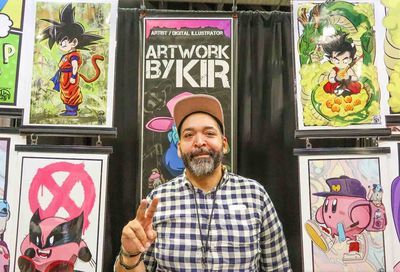Rites of Passage
Alphabet Soup
A few weeks ago, Olivia told me in no uncertain terms that girls can’t marry girls. Tempted though I was to pat her down for her Republican Party ID card, I knew Olivia was right, technically. At age 3, she knows what’s going on. Girls can’t marry girls.
But for the purposes of our discussion that day, Olivia was wrong. We were sitting in a classroom at my church, my Unitarian Universalist church, notoriously safe space for gay men and lesbians and other alternative souls.
One of my hobbies is small children — not in the Michael Jackson sense, no, just in the way that seeing the world through their eyes captivates me and intrigues me and always teaches me something new. As an extension, I lead preschool religious education classes at my church, insofar as there is any religious doctrine at a Unitarian church, particularly at the preschool level.
That Sunday, Olivia was teaching me that there are certain absolutes in life, and one of them is that girls cannot marry girls. I was trying to tell her that girls can in fact “marry ” girls in our church, but she stood firm. One of her little classmates even piped up in Olivia’s defense, which surprised me since his mother is a partnered lesbian, but I chose not to push that point with him.
With preschool kids, you have to choose your battles, and outing one of them as a member of an alternative family in front of all the others isn’t necessarily a wise course of action.
|
For the purpose of our lesson that day, the other teacher and I had brought photos from our respective wedding and commitment ceremonies. I had photos showing myself and my partner in the sanctuary of the very church where my class now sat — photos of us saying our vows, being watched and supported by rows and rows of people. My teaching partner had photos from her two wedding ceremonies — one from when she was quite young, she explained, and one from the man she’s married to now, after her first marriage ended.
So when Olivia told me that girls can’t marry girls, I reminded her of the photos I’d brought and showed them to her again. No dice. It was like I was telling her the world was flat because I’d sailed off the edge of it.
“It’s round, ” she insisted.
Olivia and I didn’t go into the legal issues of same-sex marriage — how she was, technically, correct, but that certain institutions and some nations and even one of this country’s very own states allow gay marriages or quasi-reasonable facsimiles thereof. But I found myself in an indisputably awkward position, trying to convince Olivia that sometimes girls do marry girls, knowing that the U.S. legal system is an adamant 3-year-old: “No they don’t. ”
The encounter reminded me, somewhat painfully, of the time in eighth grade when a boy took a fancy to me and decided he wanted me to be his girlfriend. He was cute and charming and probably would have been a great boyfriend — but as I’d find during the several years to come, I was never interested in the boys who were interested in me. When I was trying to be straight, I got crushes on boys and young men who were just barely out of my reach for one reason or another. It was, as it turns out, pretty convenient — I didn’t have a chance to break many hearts except for my own.
This eighth-grade incident came to mind in the wake of Olivia’s resolute attitude because when that boy, Darby, who was in seventh grade, received my blushing and apologetic rejection, during which I made something up about going off to high school soon and wanting to enter that sphere unencumbered by romantic attachment, he didn’t take it so well.
Darby decided he would spread a rumor about me, and declared that he would issue a correction if and when I decided to date him. First he told me the rumor, and when I didn’t react in a way that he found satisfactory, he started telling his friends.
“Kris Campbell, ” he would declare in the hallways, “has VD. ”
(For those who are under a certain age or who have poor memories, VD stands for venereal disease, which is what we used to call sexually transmitted diseases before they became STDs.)
I couldn’t believe it. I was twelve years old, and couldn’t have been further away from having acquired anything sexually transmitted. The truth would have made a much more interesting rumor, but he wasn’t sophisticated enough to think that one up, I guess.
While he pined for me, I pined for my friend Stephanie, came out as sexually scared and confused to a teacher, and contemplated suicide outside the school building in the afternoons — but this was because I was figuring out that I was a lesbian, not because people might think I had VD.
One day I passed Darby in the hall while he told one of his friends this catchy rumor of his. I decided to put a stop to things. “He’s lying, ” I told her, in an uncharacteristically bold confrontation.
“No he’s not, ” she told me.
“Yes, he is! ” I said, my cheeks turning beet red, my heart pounding and tears welling in my eyes. I have never handled frustration well.
“No, he’s not lying, ” she said. “You have VD. ”
I think her name was Olivia. Maybe not. I have no idea what her name was. I’d like to say I laughed and walked away, but I think I went running into my teacher/confidant’s classroom, probably crying. I think she told them to cut it out, maybe threatened them with detention. Like they cared.
A few days later, one of those unreachable boys I’d once had a crush on called out my name and jogged to catch up with me while I was walking home. He asked me about the rumor. “That isn’t true, is it? ” I could have cried, he was so tender and gentle and willing to defy the middle school rumor mill. I assured him that it was not.
The VD rumor caused me a few more weeks of grief, and then one day it disappeared. A little while later, I went off to high school, where no one questioned my sexual past or health history, and the lesbian demons I’d fought with in the junior high schoolyard grew larger than life and eventually became a reality I learned to take pride in and enjoy.
Back in 2003, in a preschool classroom with a stubborn 3-year-old, I didn’t falter in my pride or my certainty that, at least as far as Unitarian Universalists are concerned, girls can marry girls. After class, I mentioned the encounter to Olivia’s mother, who apologetically said that Olivia is going through a little phase about that. I was convinced that Olivia is in good hands, and soon will understand the complexities of same-sex marriage in the eyes of her church and her larger society.
In the meantime, I thanked the Unitarian godlike presence that my class that day also included Max, a 4-year-old who went to town during our mock weddings session with toy people, marrying up to six of them to each other at a time. It turns out that Max is a natural progressive, a boy after my own heart.
One of his marrying sets happened to be two men — how traditional, only two! I was providing voice and dialogue for the wedding officiant, and asked Max what the first man’s name was. “John, ” he told me. So I asked the second man’s name. “Um Â… his name is John too! ” he giggled.
“You know, ” I told him, reassured of my place in that world, “that happens sometimes. Sometimes boys named John marry other boys named John. ”
Kristina Campbell has a Max-like view of marriage and the world. Her column runs biweekly, and she can be reached at kcampbell@metroweekly.net.
Support Metro Weekly’s Journalism
These are challenging times for news organizations. And yet it’s crucial we stay active and provide vital resources and information to both our local readers and the world. So won’t you please take a moment and consider supporting Metro Weekly with a membership? For as little as $5 a month, you can help ensure Metro Weekly magazine and MetroWeekly.com remain free, viable resources as we provide the best, most diverse, culturally-resonant LGBTQ coverage in both the D.C. region and around the world. Memberships come with exclusive perks and discounts, your own personal digital delivery of each week’s magazine (and an archive), access to our Member's Lounge when it launches this fall, and exclusive members-only items like Metro Weekly Membership Mugs and Tote Bags! Check out all our membership levels here and please join us today!




















